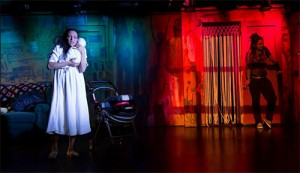Some demons are imaginary and some of them are real, and during a climactic moment in
Little Children Dream of God, they all engulf the stage.
Jeff Augustin's play, now in Roundabout's Underground series, follows a Haitian immigrant named Sula, who has floated to Miami on a car tire in search of a better life. Eventually, though, her past catches up with her, which leads to an explosion of voodoo power: Frantic drums tear through the speakers; dazzling light fills the tiny black box stage; and actress Carra Patterson stamps her feet and waves her hands, controlled by something guttural and fierce.
But while this scene is distinctly theatrical, it's also rooted in Augustin's real-life Haitian heritage. "The way my mom and my grandmother told stories, there's a sense that at any point anything could happen," the playwright says. "There's always a hint of something magical, spiritual. Something 'Oh wow!' To me there's magic in the everyday."
Fittingly,
Little Children Dream of God juxtaposes otherworldly images with the realistic behavior of an immigrant community. Friends may chitchat and joke at each other's expense, but a man may also light a candle by waving his hand. And when an otherwise rational character insists with unwavering clarity that God has impregnated her 11 times, her neighbors won't necessarily dispute it. "I have found that practical people can believe in anything," says Augustin.
Director Giovanna Sardelli describes the world of "Little Children Dream of God" as brimming with possibility. "There aren't a lot of things that are defined but a lot that are accepted," she says.
In developing the piece, she and Augustin set out to learn more about Sula's origins so as to better understand her journey to a rundown Miami apartment complex. This meant hiring a real voodoo priestess to answer questions, as well as Haitian drummers to create the play's musical setpieces. "We went into the tiniest room ever with our actors and three Haitian drummers---which we should have videotaped for a reality show," remembers Sardelli of the recording process. At first she wanted slow drumming, a tame sound she could control as a director---"I kept saying, is there any Josh Groban of voodoo drumming?"---but she soon realized Haitian music takes on a life and intensity of its own.
"Every time they started drumming it just was what it was," she says. "Jeff and I had this moment where we just embraced it."
The same principal applied to Sula's dance with demons. "I keep going back to
the Scottish play, to Shakespeare," Sardelli says. "It's just like Lady M: What are you calling in? What do you want to do once they're here? How do you know when they've arrived?"
Augustin, too, had to give in to his play's power. As he developed the script, one character became less and less relevant to the overall story. He was daunted, however, by the idea of cutting him entirely. What if tugging that thread unraveled both plot and character development?
But then, not long before an important reading, the actor playing that unnecessary character was cast in a TV show. That gave both playwright and director the opportunity to reexamine and restructure the play. A stroke of luck? Or was the play perhaps deploying its own brand of magic? Laughing, Sardelli says, "The gods of theatre smiled upon us!"
---
Jack Smart is a staff writer at Backstage. Originally from Hawai'i, he dreams of warm beaches when the winter winds come. He blogs about theatre and pop culture at JackSmartReviews.Photo by Joan Marcus